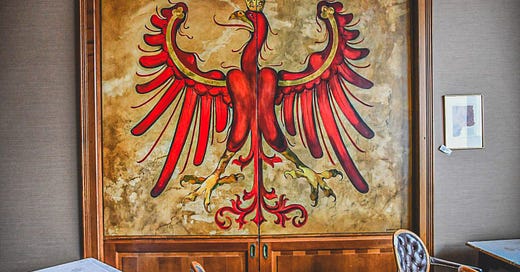Tyrol Déjà-vu
Austria's federal government and state authorities in Tyrol have fought over how best to contain the rapidly-spreading B.1.351 coronavirus variant
Servus!
It was around this time last year that a viral mutation, having ripped through villages and ski resorts in Tyrol’s Pauznan valley, broke out of the state and spread throughout Austria and the rest of Europe. If you happened to go skiing in the now-notorious party town of Ischgl during the 2020 winter season, the must-have souvenir was a hacking cough and a loss of taste and smell. Back then, state authorities turned a blind eye to reckless practices by visitors and resort owners, too slow to respond to the prospect of tourists entering, leaving, and taking the coronavirus with them.
Here we are again. First came the B.1.1.7 or British variant of the coronavirus. On January 3, several British ski instructors in Jochberg in the district of Kitzbühel reported symptoms, and by the middle of the month, there were 17 confirmed cases of the particular British strain of the virus there. At a time when Austria had imposed a landing ban on flights from the United Kingdom, there were still somehow 38 British people living as ski instructors in Tyrol. The ski school operators in Jochberg claimed their guests had arrived in October and December before new travel rules had been introduced.
After the British variant came the South African one, B.1.351, having been introduced to Tyrol by a resident returning from a golfing vacation. As of Monday, there were 165 confirmed B.1.351 cases in the state. Though the seven-day COVID-19 incidence rate statewide is currently at 84.7 cases per 100,000 residents, in certain districts like Lienz (283.1) and Schwaz (138.7), the rate is far higher the national average (102.7). Such is the vigorousness of the South African variant in particular that Dorothee von Laer of Innsbruck’s Medical University has warned of a ‘second Ischgl’ if measures to counteract it are not taken soon.
What is to be done has been subject to intense discussion in recent days. Having just come out of a lockdown during which their economy, far too dependent on leisure and tourism, took a hammering, state authorities in Tyrol have shown no desire to enforce another clampdown. On Monday morning, they set out a packet of measures like requiring a negative COVID test in order to use ski lifts that tinker with the status quo while keeping things open. This did nothing to allay Vienna’s fears. On Monday evening, the federal government issued a travel warning for the state and on Tuesday afternoon announced that, as of Friday, Tyroleans would only be allowed to leave the state if they could produce a negative COVID-19 test result no more than 48 hours old.


It is no surprise that Tyrol is a viral hotbed once more. Someone living in Vienna could not play tennis during the third national lockdown or walk in the botanical gardens, but in the western states like Tyrol, the ski lifts remained open. Austrians have been entering and leaving the state to visit their second homes of dubious legal status. Around six ski schools across Tyrol, including the aforementioned petri dish in Jochburg, remained open. And an investigation by the state broadcaster ORF showed how easy it is, in spite of a formal ban on hotel stays for tourism purposes, to book a hotel room or holiday apartment in Tyrol’s ski resorts.
The shambles in Tyrol is a product of Austria’s federal model. Though the center is responsible for legislating, it is the states who are responsible for implementing the law. But it is also the result of competing interests, people’s pockets and people’s health. Tyrol is a state in which the governing party (the ÖVP), the ÖAAB (the ÖVP’s offshoot inside of the Chamber of Labour), the Chamber of Commerce, the Chamber of Agriculture, and special interests representing hotel owners and ski lift operators are very tightly knit. Who is being allowed to dictate public health policy in the middle of a pandemic: the chancellor, the health minister, or hotel and ski lifts owners?
Bis bald!
Thank you for subscribing to the Vienna Briefing. Do you know someone who would be interested in receiving this newsletter? Consider sharing it with them today.
No Coalition Crack-Up
A coalition break-up was avoided Thursday when the ÖVP and Greens agreed to establish a child welfare commission that will investigate and advise authorities on the issue of asylum cases involving possible child deportation. The commission will be headed by former Chief Justice of the Supreme Court Irmgard Griss.

Terror Investigation Setback
The investigation into November’s terror attack in Vienna has suffered a setback after a close friend of the assailant was found dead in an apparent act of suicide, state prosecutors confirmed Friday. 10 people remain in custody in connection with the investigation.
Amazon It Is, Then
Kaufhaus Österreich, an attempt to create an e-commerce portal for Austrian business that could compete with Amazon, is to shutter 71 days after it was launched. The state is believed to have spent around $727,000 (€600,000) on the failed project.




